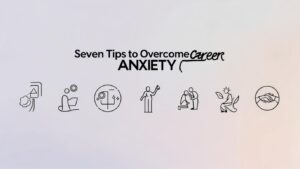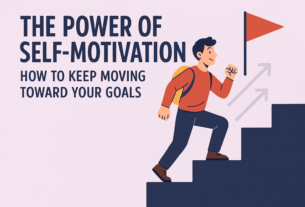Many people have a problem with their careers because they can be a source of stress. As humans, we like the idea of certainty, but not knowing what we want to do with our career or whether we are going to enjoy it can be extremely uncertain. Even if you know what you want to do and enjoy, there is no guarantee that you will be able to turn it into a well-paid and successful career, which again adds to the stress.
Career Anxiety and Self-Doubt

This translates into career anxiety — a lot of worry, apprehension, and self-doubt about whether we’re really on the right track and whether we’re doing well in our current jobs. A while back, I spoke with Grace Lorden, a professor of behavioral science, who has written a book about how to find and succeed in a career you truly enjoy. In this article, we’re going to talk about seven evidence-based techniques you can use to move toward a career you truly enjoy.
Seven Tips to Overcome Career Anxiety

Tip 1: Task Over Title
I’ve seen many people attach themselves to job labels — they want to be a businessman, an investment banker, or a doctor. Others are attached to lifestyles, some want to go on vacations, or buy a particular car. The real question should be: What tasks will I do every day in this job, and will I enjoy them?
Psychology studies show that much of career success comes from happiness at work. If you focus too much on the title, you can forget about the actual day-to-day work. Tim Urban’s “Pixel Theory” explains it well – while life is a big picture, we live in individual pixels. Our happiness comes from these daily tasks rather than the grand prize we pursue.
Tip 2: Visualize Your Me+
One of my favorite ideas from the book is the concept of “Me+” — the aspirational version of yourself. Grace Lorden suggests an exercise you can practice:
-
What is your Me+ job title?
-
What industry do you want to work in?
-
What company or type of company do you want to be in?
-
What responsibilities and tasks do you enjoy?
Once you identify what you enjoy, you can start taking small steps towards making it a reality.
Tip 3: Audit Your Time
A simple but effective strategy is to audit your time. Write down what you do throughout the week and assess whether you enjoy it. Do you feel a sense of purpose? Is it leading you toward your long-term career goals?
The key is to eliminate activities that drain your energy and are not compatible with your ideal career.
Tip 4: 13 Minutes a Day
Investing in small, daily tasks leads to significant long-term benefits. Grace Lorden recommends 90 minutes a week—that’s just 13 minutes a day—to develop the skills that will help you build the career you love.
For example, if your dream career involves coding, you could spend 13 minutes a day learning to code. This won’t make you a pro overnight, but over time, those minutes will add up to mastery.
Tip 5: You Probably Don’t Need to Go Back to University
For people who are unsure about their career direction, committing to a four-year degree or an expensive master’s program may not be the best option. There are countless resources available online that allow you to learn for free or at a low cost.
Many employers value practical experience over additional degrees. If you’re considering going back to college, first explore whether you can gain the skills you need through alternative learning methods.
Tip 6: Embrace U-Turns
Even once you’ve identified the right career path, you may want to change direction later. Human preferences and values change over time, a concept known as the “end of historical illusion.” Research shows that we underestimate how much we will change in the next 10 years.
Many people are afraid to make a career U-turn, fearing that it signals inconsistency. However, being open to change and willing to pivot is critical to long-term career satisfaction. Making deliberate, informed career changes is not failure – it’s a necessary part of growth.
Tip 7: The Grid Search Mindset
If you don’t have a clear vision for your ideal career, use the “grid search” method. Identify activities you enjoy—education, creative work, business, etc.—and look for opportunities that incorporate those elements.
Looking back, it’s easy to connect the dots backwards, but it’s hard to predict the future. The key is to keep looking, set your goals, and take small steps in the right direction.
Final Thoughts
Finding your career is an ongoing journey, not a final destination. As long as you are consistently working towards your ideal career, making informed changes, and embracing growth, you will eventually connect the dots and create a fulfilling career path.




